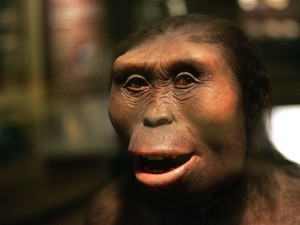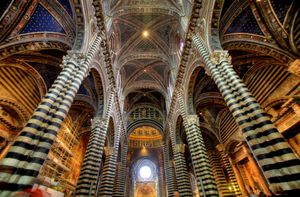This semester, I’ve been taking biological anthropology, learning all about australopithecines, Homo habilis, Neanderthals, and our other hairy hominid ancestors. Now, you have to understand—this is a big deal for me.
I come from a Bible Belt public school upbringing, where my science teachers always prefaced the unit on evolution with, “Now, remember, this is just a theory…” and my middle school science teacher even went so far as to tell us, “I just want you to know, I don’t actually believe this. But they still force us to teach it to you.”
So you can imagine what kind of positive influence that had on our budding hunger to learn about human origins (none, exactly).
So this class has been wonderful. Yes, I had known the pop culture elements—Lucy’s fossils, the caveman art, the dawn of early man. I had visited the Hall of Human Origins at the Smithsonian and cocked my head at the wax figure of the tiny Ardipithecus. But in this class, I’ve been learning about specifics. The evolution of bipedalism. How we lost space in our guts in order to evolve bigger brains that used up more energy (making cooking food to make it more digestible an essential element of human evolution—sorry, Paleo diet people).
It’s filled me with wonder—the fact that over millions of years, we evolved from ape-like animals to humans. Theologically, I know that pains some people. They want the security of knowing God created us special. But I think there’s an innate and enormous glory in our human story.
I was thinking about it while listening to Bach at Marsh Chapel yesterday. The soaring sopranos, the brassy trumpets, the deep and dark bass strings plucked pizzicato. The sheer transcendent beauty that one human composer brought to life, and that the performers create out of thin air with their voices and instruments.
In the same vein, at Interfaith Shabbat this past Friday, Brittany (our keynote speaker) talked about religion and art, and asked us to share an example of when art caused us to have a religious experience. I talked about visiting the cathedral of Siena this summer in Italy, moved to tears by the soaring ceilings painted deep blue with stars, mirroring celestial reality. The huge dimensions and echoing chanting and the weight of centuries of people’s prayers and hopes hanging over the space stirred something deep within me. I cried because humans, with their simple and mortal hands, had created something so beautiful and lasting and moving.
We are so, so incredibly lucky that we have music and art and a connection to God.
For me, my theology goes something like this: the universe is a vast interconnected web—and God is what knits that web together. That divine spark is what ties living beings to each other; it is what makes stars burn and black holes explode and everything dance together in a cosmic symphony.
However, most animals don’t have the gift of being able to realize it. Much as we admire the grace of the tiger or the intelligence of the elephant, the truth is that their lives are more concerned with survival than cosmology.
But we, as humans, that race that struggled to stand on two feet, that slowly grew brains large enough to start looking up at the stars and thinking bigger—we are so blessed. And yes, I think that God nudged us in that direction, awakened that spark already inherent within us. It was what made Neanderthals start burying their dead with flowers. It was what made ancient humans start carving sacred objects. It was made us start to think deeper.
And with that deeper thought—that realization that the universe is a grander thing than just our struggle for survival, and that the world is an interconnected place—I think we have a duty to love. As such an advanced species, we have the ability to appreciate the glory of the universe and to honor the divinity within each being (human and otherwise). It takes our human interpretation to see that God is love, and that we should act in love.
This is what makes us different. Biological anthropologists see it, too—the moment when early hominids started taking care of their old and feeding the sick, instead of letting them die. When we started to value the other, and not just the self. When love became a concept we recognized.
Yes, humanity is flawed. It does horrible and evil things. It stumbles. But in the end, we are still so blessed, because we have the chance to know God—and to worship God—in a sacred and unique way among all beings.


4 Comments
data hk posted on October 29, 2019 at 10:45 pm
Are you able to give a Rim theme? This web page is hard to learn Biological Anthropology Theology | Marsh Vocation or else for those of us surfing around using cell phones. Normally, in case you are listed the RSS sign up, that could be excellent furthermore. data hk https://www.hongkongpool.co
toto365pro posted on August 29, 2022 at 2:31 am
Quality articles or reviews is the key to interest the users to go to see the web page,
that’s what this website is providing. https://www.toto365.pro
sportstototvcom posted on August 29, 2022 at 2:32 am
This post is in fact a fastidious one it helps
new internet visitors, who are wishing in favor
of blogging. https://www.sportstototv.com
betmantotopro posted on August 29, 2022 at 2:32 am
I’m not trying to force myself to write, but I’m writing happy things becae I like you. That’s how I naturally feel. I’m also emotional and excited. I’m gaining good confidence, too. https://www.betmantoto.pro